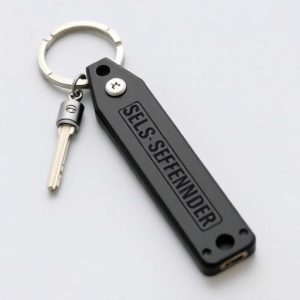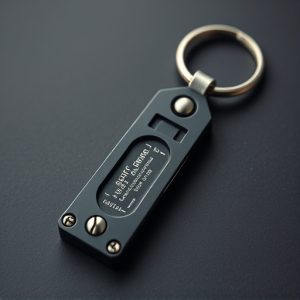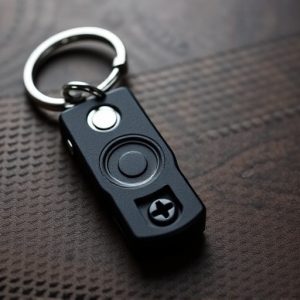State Laws on Non-Lethal Keychain Weapons for Self-Defense
The legality of non-lethal keychain weapons (pepper spray, stun guns, Tasers) varies widely across U…….
The legality of non-lethal keychain weapons (pepper spray, stun guns, Tasers) varies widely across US states, with some permitting them for personal protection while others restrict or prohibit them. Users must understand local laws to ensure compliance and promote safety, checking statutes, and consulting law enforcement resources before carrying these devices. Key factors include weapon type, concealed weapons laws, and local ordinances; legal status often hinges on state-specific rules, age restrictions, training requirements, and permit obligations. Staying calm and cooperative with law enforcement is crucial if encountered, politely explaining their purpose for self-defense while displaying necessary permits when requested.
“In today’s world, personal safety is paramount. Exploring non-lethal keychain weapons as a self-defense tool has gained traction, but understanding legal requirements is essential. This comprehensive guide delves into the legality of these compact devices, focusing on state-specific laws governing their use for self-defense. We’ll explore what makes a keychain weapon non-lethal and whether it’s allowed in your state. By understanding the rules, you can confidently carry a non-lethal keychain weapon for peace of mind.”
- Understanding Non-Lethal Keychain Weapons: Definition and Legality
- State-Specific Laws Governing Self-Defense Keychains
- Legal Requirements for Carrying a Non-Lethal Self-Defense Keychain
- What to Do If Encountering Law Enforcement with Your Keychain Weapon
Understanding Non-Lethal Keychain Weapons: Definition and Legality
Non-lethal keychain weapons, also known as personal defense keychains, are small, compact devices designed to provide individuals with a means of self-defense in various situations. These tools are intended to incapacitate or deter an attacker temporarily without causing permanent harm. Keychain pepper sprays, stun guns, and Tasers are popular examples of non-lethal weapons that can fit comfortably on a key ring.
The legality of carrying such devices varies significantly from state to state in the US. Some states explicitly allow the possession of non-lethal keychain weapons for personal protection, while others have strict restrictions or prohibit them entirely. It’s crucial to understand the specific laws in your area before considering carrying a non-lethal keychain weapon. Checking local statutes and consulting law enforcement resources can help ensure you remain within legal boundaries, promoting safety without crossing into potentially illegal territory.
State-Specific Laws Governing Self-Defense Keychains
In the United States, the legal landscape surrounding self-defense keychains varies significantly from state to state. While federal law does not specifically regulate non-lethal keychain weapons, individual states have enacted their own laws and regulations. Some states explicitly allow the carrying of certain types of self-defense keychains, while others have stricter restrictions or outright ban them.
The legality of self-defense keychains is often determined by factors such as the type of weapon attached to the keychain (e.g., pepper spray, Taser), the specific state laws regarding concealed weapons, and any local ordinances that might further restrict their use. States like Texas and Florida generally permit the carrying of non-lethal keychain weapons for self-defense, while other states may require permits or have specific restrictions on where and how they can be used. Understanding these state-specific laws is crucial before considering the acquisition of a self-defense keychain to ensure compliance with local regulations.
Legal Requirements for Carrying a Non-Lethal Self-Defense Keychain
In many jurisdictions, the legality of carrying a non-lethal keychain weapon, often referred to as a self-defense keychain, depends on specific state laws and regulations. These laws vary widely across different states, so understanding what is allowed in your location is crucial before you consider carrying such a device for personal safety. Non-lethal keychain weapons, which typically include items like pepper spray or Tasers, are generally legal to possess and carry for self-defense purposes, provided they meet certain criteria.
The key requirements usually involve age restrictions, allowing only adults over a specific age (often 18) to purchase and carry these devices. Additionally, some states mandate that individuals undergo training or have a permit to carry pepper spray or Tasers for self-defense. It’s important to check if there are any size or capacity limitations on the device as well, as certain states might restrict the amount of pepper spray or the voltage of a Taser allowed in such compact forms. Always ensure compliance with local laws to avoid legal repercussions when exercising your right to carry a non-lethal self-defense keychain.
What to Do If Encountering Law Enforcement with Your Keychain Weapon
If you’re carrying a non-lethal keychain weapon, it’s crucial to be aware of how to interact with law enforcement if you encounter them. First and foremost, remain calm and comply with their instructions. Remember that most interactions with law enforcement are routine and meant to ensure everyone’s safety. If they notice your keychain weapon, inform them politely yet firmly that it is a non-lethal self-defense tool. Avoid any aggressive behavior or statements, as this may escalate the situation.
Instead, cooperate by placing the weapon in plain view or as directed, while maintaining your hands visible. Explain the purpose of the device—to deter and incapacitate an assailant without causing permanent harm—and show them any necessary permit or identification. Law enforcement officials are generally more concerned with public safety than personal belongings; demonstrating that you have a legal right to carry this device and that it poses no immediate threat can help de-escalate the situation.
Understanding the legal requirements surrounding self-defense keychains is essential for those seeking personal protection. Each state has its own set of rules regarding these compact weapons, ranging from strict limitations to relatively relaxed regulations. Knowing your rights and adhering to local laws is crucial when carrying a non-lethal keychain weapon for self-defense. With proper research and awareness, individuals can ensure they remain within legal boundaries while protecting themselves in unexpected situations. Remember, staying informed about your state’s specific laws regarding non-lethal keychain weapons allowed is key to responsible self-defense.


